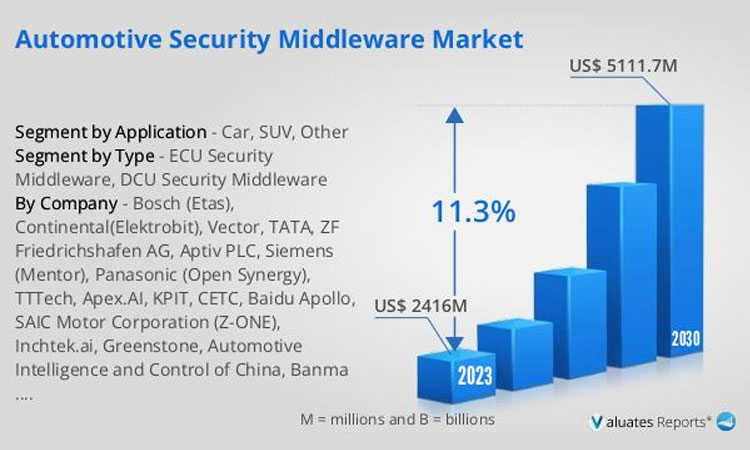Automotive Cyber Security Market is Segmented by Type (Software-based, Hardware-based, Network & Cloud, Security Services & Frameworks), by Application (Passenger Cars, Commercial Vehicles).
The Global Automotive Cyber Security Market is projected to grow from USD 754.4 Million in 2024 to USD 3574.5 Million by 2030, at a Compound Annual Growth Rate (CAGR) of 29.6% during the forecast period.
Major Factors Driving the Growth of Automotive Cyber Security Market:
The automotive cybersecurity market is expanding rapidly, driven by the increasing adoption of connected and autonomous vehicles, rising cybersecurity threats, and stringent regulatory frameworks. Key segments such as software-based, hardware-based, and passenger car applications dominate the market, offering comprehensive protection for modern vehicle systems.
As automakers invest in advanced cybersecurity technologies and partnerships, the market is poised for sustained growth, ensuring safer and more secure mobility solutions.
Trends Influencing The Growth Of Automotive Cyber Security Market:
Software-based solutions are a significant driver of the automotive cybersecurity market, addressing the rising demand for secure connected vehicles. With the increasing adoption of in-car technologies like infotainment systems, telematics, and autonomous driving features, software-based cybersecurity ensures the integrity and confidentiality of vehicle data. These solutions offer advanced protection through encryption, firewalls, and intrusion detection systems, safeguarding against threats such as hacking and data breaches. The growing complexity of vehicle software, coupled with the proliferation of over-the-air updates, has heightened the need for robust cybersecurity measures. Manufacturers and OEMs are integrating software-based solutions to comply with evolving regulatory frameworks and ensure customer trust. Additionally, AI-driven software enhances real-time threat detection and response capabilities, aligning with the automotive industry’s push for safer and smarter vehicles. As connected vehicle ecosystems continue to expand, software-based cybersecurity solutions are expected to play a pivotal role in driving market growth.

Hardware-based solutions are crucial to the growth of the automotive cybersecurity market, providing foundational protection for critical vehicle systems. These solutions include secure microcontrollers, hardware security modules (HSMs), and trusted platform modules (TPMs) that safeguard vehicle electronics against tampering and unauthorized access. Unlike software-only systems, hardware-based cybersecurity offers an additional layer of security by embedding protection directly into vehicle components, such as ECUs and sensors. The rise of connected and autonomous vehicles has increased the vulnerability of automotive systems, making hardware-based solutions indispensable for ensuring system integrity and resilience. Regulatory requirements, such as UNECE WP.29, mandate robust cybersecurity measures, further driving the adoption of hardware-based solutions. Manufacturers are leveraging these technologies to enhance in-vehicle safety and meet compliance standards. As automotive architectures evolve to include advanced driver-assistance systems (ADAS) and electric drivetrains, the role of hardware-based cybersecurity in mitigating risks is set to expand.
Passenger cars are a major growth segment in the automotive cybersecurity market, driven by the increasing adoption of connected technologies in vehicles. Features such as advanced driver-assistance systems (ADAS), infotainment platforms, and vehicle-to-everything (V2X) communication enhance convenience and safety but also expose vehicles to potential cyber threats. Cybersecurity solutions for passenger cars focus on securing communication channels, preventing data breaches, and protecting sensitive information like location data and user credentials. Rising consumer awareness of vehicle security, coupled with regulatory mandates, has compelled automakers to prioritize robust cybersecurity systems in passenger cars. The growing penetration of electric and autonomous vehicles, which rely heavily on interconnected systems, further underscores the need for comprehensive cybersecurity measures. As the passenger car segment continues to lead global vehicle sales, its contribution to the automotive cybersecurity market is expected to grow, shaping the industry’s approach to secure mobility solutions.
The rise in connected vehicles, equipped with internet access and advanced communication capabilities, has significantly driven the automotive cybersecurity market. These vehicles rely on data exchange for navigation, infotainment, and telematics, making them susceptible to cyber threats. Cybersecurity solutions ensure secure data transmission, protecting vehicles from unauthorized access and potential attacks. As connected vehicle adoption grows, so does the demand for robust cybersecurity measures.
Stringent regulations mandating cybersecurity in automotive systems are a key driver of the Automotive Cyber Security Market. Frameworks like UNECE WP.29 and ISO/SAE 21434 require automakers to implement comprehensive security measures to safeguard vehicle systems. These regulations compel manufacturers to invest in cybersecurity solutions, ensuring compliance and enhancing consumer trust. Furthermore, autonomous vehicles rely heavily on interconnected systems for navigation, decision-making, and safety. These systems are vulnerable to cyber threats, necessitating advanced cybersecurity measures. Solutions such as real-time threat detection and secure communication channels are critical for the safe operation of AVs, driving demand in the cybersecurity market.
Key Companies:
- Harman (TowerSec)
- SBD Automotive & Ncc Group
- Argus
- BT Security
- Intel Corporation
- ESCRYPT Embedded Systems
- Trillium
- Secunet AG
- Security Innovation
- Symphony Teleca & Guardtime
- Utimaco GmbH
- Arilou
- Cisco
- Arilou Technologies
- Cisco Systems
- NXP Semiconductors


